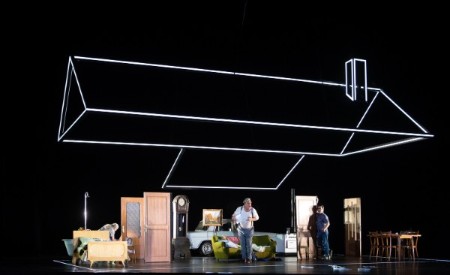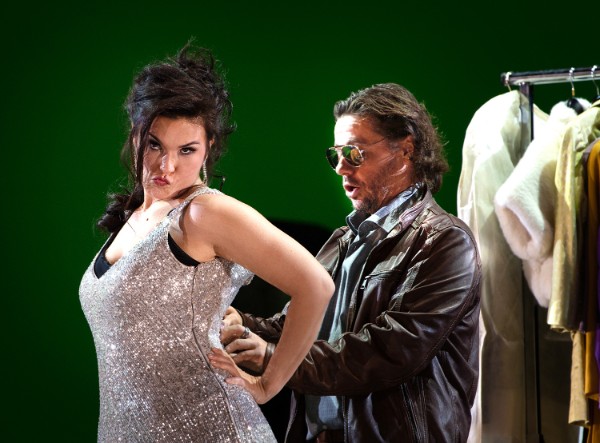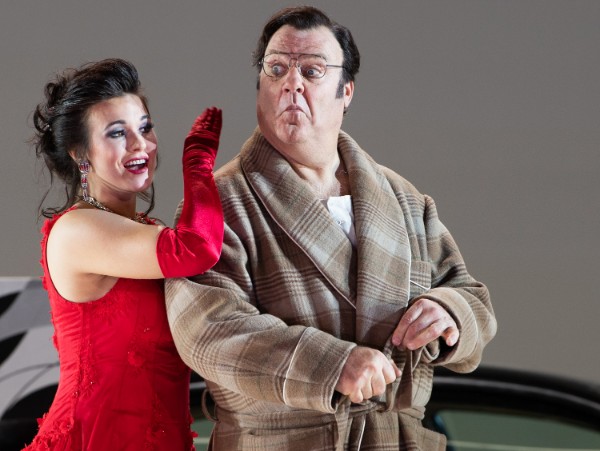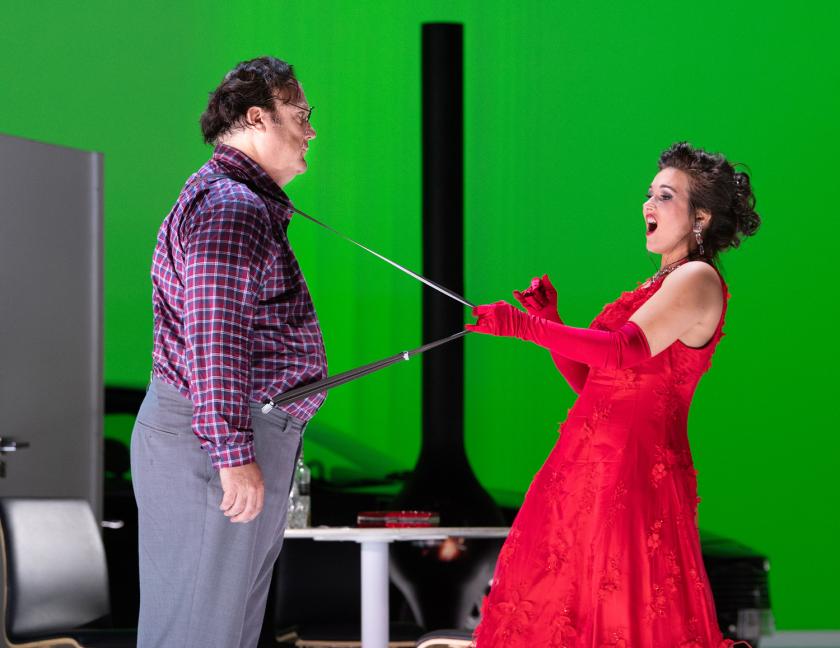Venetian director Damiano Michieletto’s new Royal Opera production of Donizetti’s Don Pasquale is a clever and entertaining mix of old and new. The curtain rises to reveal a skeleton of a 1960s style house - there are doors, but no walls, revealing a gleaming white vintage car parked outside. The roof and chimney are formed of strip lights like an architect's sketch hanging in mid air and completing the picture.
It would be striking if you could get a proper look at it, but the sheer brightness of the lighting - inconveniently placed between the stage and the supertitles - is a tad strenuous on the eye. You’d be forgiven for thinking that’s the era this production’s set in, but set designer Paola Fantin’s expertly curated period furniture serves to let the audience know quite how old fashioned the ageing Don Pasquale’s home interiors are, as made evident by the set change at the end of the first act, which transforms the stage to a thoroughly modern photography studio, with a green screen and live video projection.  By far the biggest name in the cast, Bryn Terfel is commanding yet also endearing as the buffoonish Don Pasquale, though it was Russian-German soprano Olga Peretyatko who really stole the show, making her Royal Opera House debut in the role of Norina, who’s betrothed to Don Pasquale’s nephew, Ernesto. Don Pasquale refuses to see the pair married given Norina’s lowly status, so he decides he will marry himself, and, despite his advanced years, produce an heir.
By far the biggest name in the cast, Bryn Terfel is commanding yet also endearing as the buffoonish Don Pasquale, though it was Russian-German soprano Olga Peretyatko who really stole the show, making her Royal Opera House debut in the role of Norina, who’s betrothed to Don Pasquale’s nephew, Ernesto. Don Pasquale refuses to see the pair married given Norina’s lowly status, so he decides he will marry himself, and, despite his advanced years, produce an heir.
We first meet Norina as a wardrobe assistant, dressing a glamorous couple for a photoshoot. When approached by Dr Malatesta - impressively sung here by Austrian baritone Markus Werba - she transforms her outfit from a plain demin dress to a stunnig sequined gown, illustrating the duplicity of the role, as Malatesta conveys to her his plan that she pretends to be his sister, and seduce the stupid old man. Norina vows to make life so difficult for Don Pasquale that he’ll eventually allow her and Ernesto to marry, Peretyatko and Werba’s duetting here (pictured below) was playful and cheeky.  As the curtain comes up on Act III, it reveals a dozing Don Pasquale back in his house, which is now devoid of all the old fashioned furniture. The chorus, dressed as builders and removal people, soon start to fill it with the expensive, up to date items purchased by Don Pasquale’s new bride. As they all hand him bills, it harks back to an earlier scene when several small boys came on stage, presumable Pasquale’s imagined heirs, and handed him hand-drawn pictures. How different is Don Pasquale’s reality to the marital bliss he’d dreamt of! Peretyatko now wears a dazzling red gown, a stark contrast to Terfel’s dowdy dressing gown and pyjamas.
As the curtain comes up on Act III, it reveals a dozing Don Pasquale back in his house, which is now devoid of all the old fashioned furniture. The chorus, dressed as builders and removal people, soon start to fill it with the expensive, up to date items purchased by Don Pasquale’s new bride. As they all hand him bills, it harks back to an earlier scene when several small boys came on stage, presumable Pasquale’s imagined heirs, and handed him hand-drawn pictures. How different is Don Pasquale’s reality to the marital bliss he’d dreamt of! Peretyatko now wears a dazzling red gown, a stark contrast to Terfel’s dowdy dressing gown and pyjamas.
In fact, the costumes are great, that of Don Pasquale’s nephew Ernesto possibly excepted. His blue-grey polo shirt makes the character look like he’s going to work in a suburban call centre on dress down Friday. Romanian tenor Ion Hotea’s singing though was by no means drab, his crisp, light voice giving a tenderness to the lovelorn, and slightly naive Ernesto.  As Norina and Ernesto meet in the garden for a ‘secret’ tryst (they’ve left a note - or in this case a message on a smartphone - for Don Pasqaule to see) we’re back in the studio with the green screen, the two lovers live projected onto a background of forest trees. This cleverly highlights the voyeuristic nature of the scene, not to mention allowing the audience to see clearly some fabulous facial expressions from Peretyatko. Her duet here with Hotea was the most impressive ensemble singing of the night. as they sang with a rich blend and great synergy between characters.
As Norina and Ernesto meet in the garden for a ‘secret’ tryst (they’ve left a note - or in this case a message on a smartphone - for Don Pasqaule to see) we’re back in the studio with the green screen, the two lovers live projected onto a background of forest trees. This cleverly highlights the voyeuristic nature of the scene, not to mention allowing the audience to see clearly some fabulous facial expressions from Peretyatko. Her duet here with Hotea was the most impressive ensemble singing of the night. as they sang with a rich blend and great synergy between characters.
From the pit, the Orchestra of the Royal Opera House conducted by Evelino Pidó gave a perky and pithy backdrop to all the on stage action with vibrant brass and buoyant woodwind. Despite the vast theatre, the sound was quite an intimate one, and a fitting reminder of the human emotion and kindness behind this farcical tale.















Add comment